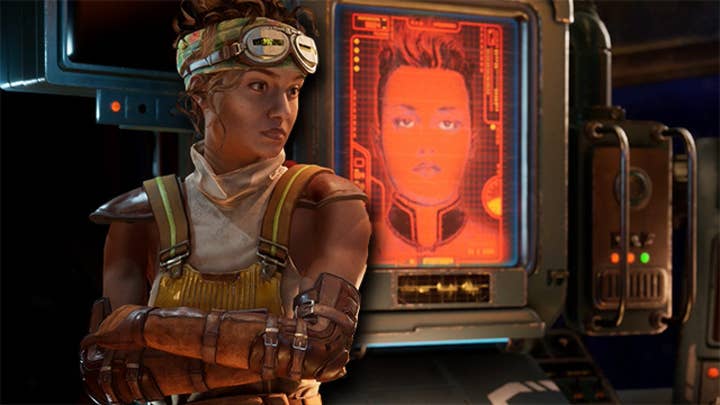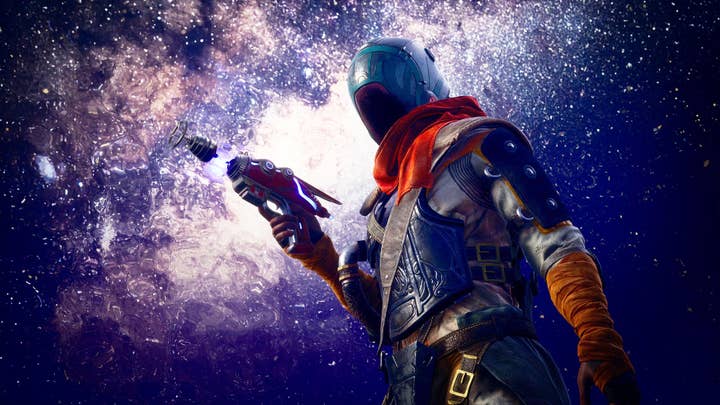Games of the Year 2019: The Outer Worlds
Obsidian Entertainment's RPG showed what the studio can achieve with the time and space to express its talent
In any given console generation, the very best games tend to be broadly agreed upon. In the era of Xbox 360, PlayStation 3 and Nintendo Wii, any objective list will include Mass Effect 2, Bioshock, Portal 2, Skyrim, Super Mario Galaxy, and so on -- all wonderful games, to be sure, but that kind of list seldom yields any true surprises.
Compiling a list of the overlooked and unfairly maligned is a much more interesting exercise. Even in the days before mobile app stores and completely open digital platforms, games still had the tendency to come and go without fanfare -- striking in the wrong way or at the wrong moment. In my list of games that didn't get their due in the last console generation, two were made by Obsidian Entertainment: Fallout: New Vegas and Alpha Protocol.
This article isn't about those games, so I will just assure you that both were excellent RPGs, but they were also games that many found it easy to dismiss due to a certain lack of polish and and no small number of technical issues. The fact that (in my estimation, at least) New Vegas was better written and underpinned by more interesting systems than Bethesda's highly regarded Fallout 3 didn't seem to matter to some critics, because the NPCs would occasionally do things like this:
And that's fair enough, to an extent. But when you spend the majority of your useful hours analysing the games industry, your head permanently behind the curtain where the hard realities of how games are made are inescapable, it becomes more and more difficult to blame a work-for-hire studio for shipping with a few bugs. I know enough about how New Vegas and Alpha Protocol were made to know that Bethesda and Sega should carry at least an even share of that burden, and yet it was Obsidian's reputation that took the biggest hit among my peers.
"The Outer Worlds is a more richly imagined universe than Fallout, more colourful in both its visual palette and its sharply defined characters"
When that generation drew to a close, I had become a champion for the studio, telling anyone who cared to listen (and a fair few who probably didn't) that, if it was given the time and space it had so often been denied by publishers, Obsidian would obliterate any doubts over its ability to ship a game that wasn't bedeviled by glitches -- the great qualities its games already possessed would shine all the brighter.
Now, Obsidian has done just that many times over in recent years, but never more comprehensively to my mind than with The Outer Worlds. It helps, of course, that there is more than a whiff of Fallout about the game's setting, which retains the frontier atmosphere of Bethesda's revamped series, but swaps nuclear age paranoia for a society built upon and steeped in corporate greed and doublespeak.
The Outer Worlds is a more richly imagined universe than Fallout, more colourful in both its visual palette and its sharply defined characters, who benefit from better line-to-line writing than anything else I've played this year (note: I haven't played Disco Elysium). It would be easy for a game with The Outer Worlds' setting to descend into bleakness and cynicism, and while it certainly has both in its locker, there is a great deal of warmth here for those with a mind to look for it -- those who've played this game will only need to see the name "Parvati" to know exactly what I mean.

The Outer Worlds' strengths are magnified by what some might argue as a weakness. While it's hardly short on content, this is not quite a AAA production in the classic sense; it was made in less time, with fewer people, and on a smaller budget than a game like Fallout 4, and while that means you can't play it for 200 hours, it also means that you don't have to play it for 100 hours to reach a satisfying ending.
I enjoyed every minute I spent with this game, and a bare minimum of those 30 or so hours were eaten up by anything that felt like filler. The Outer Worlds was published by Private Division, a Take-two label focusing on the emerging category of high-end independent development -- Panache Digital's Ancestors: The Humankind Odyssey, for example -- and if this is what a "triple-I" product looks like, I can see the category being the source of a great many of my favourite games in the future.
"I enjoyed every minute I spent with this game, and a bare minimum of those 30 or so hours were eaten up by filler"
The Outer Worlds is a great experience and part of an exciting new trend, then, but there is another reason I finished the year feeling more warmly toward this game than any other -- it was on Xbox Game Pass. The fact that a product I would have paid full-price for on launch day was just available as part of my normal subscription plan was one aspect of why that made a difference, but by no means the biggest one. The Outer Worlds was on Game Pass because Obsidian Entertainment was acquired by Microsoft, and that represents a major turning point for one of the best studios working today.
Three years ago, I interviewed Feargus Urquhart, Obsidian's CEO, about the reality of being a work-for-hire AAA developer. It remains the most honest conversation I've ever had with the leader of a major company in this industry, and it feels even more insightful in light of the step Obsidian has now taken.
"Well, you have three choices," Urquhart said on the subject of survival. "You can spend your own money, you can lie, or you can do what you're told. And generally, we've always chosen that we'll just do what we're told -- even when we don't believe in it.
"I also know this -- and I'd give this piece of advice to anybody, and it's hard to do and it's hard to take -- when you have that gun to your head you've got to get the gun away. At some point in time you have to go, 'I'm not going to keep on doing this.' I solve a short-term problem so my people will get paid, but to do that either I'm going to feel dirty or I'm going to tell those people that, guess what? All of your creativity doesn't matter. You have to do what our publisher tells us."
Obsidian has been moving further and further away from that gun-to-the-head development for several years, and now that it's part of the bold new future Microsoft is building with Game Pass, it has never been more free of those pressures. All that matters now is that it can produce games that will consistently delight and enthrall the Xbox audience.
There was never any doubt in my mind that Obsidian is capable of doing just that. After The Outer Worlds, even the most stubborn doubter has been proved wrong.


